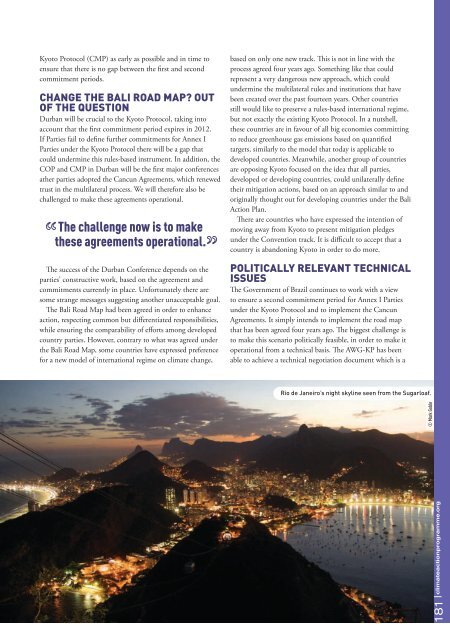Climate Action 2011-2012
You also want an ePaper? Increase the reach of your titles
YUMPU automatically turns print PDFs into web optimized ePapers that Google loves.
Kyoto Protocol (CMP) as early as possible and in time to<br />
ensure that there is no gap between the first and second<br />
commitment periods.<br />
Change The Bali Road Map? ouT<br />
oF The quesTion<br />
Durban will be crucial to the Kyoto Protocol, taking into<br />
account that the first commitment period expires in <strong>2012</strong>.<br />
If Parties fail to define further commitments for Annex I<br />
Parties under the Kyoto Protocol there will be a gap that<br />
could undermine this rules-based instrument. In addition, the<br />
COP and CMP in Durban will be the first major conferences<br />
ather parties adopted the Cancun Agreements, which renewed<br />
trust in the multilateral process. We will therefore also be<br />
challenged to make these agreements operational.<br />
The challenge now is to make<br />
these agreements operational.<br />
The success of the Durban Conference depends on the<br />
parties’ constructive work, based on the agreement and<br />
commitments currently in place. Unfortunately there are<br />
some strange messages suggesting another unacceptable goal.<br />
The Bali Road Map had been agreed in order to enhance<br />
action, respecting common but differentiated responsibilities,<br />
while ensuring the comparability of efforts among developed<br />
country parties. However, contrary to what was agreed under<br />
the Bali Road Map, some countries have expressed preference<br />
for a new model of international regime on climate change,<br />
based on only one new track. This is not in line with the<br />
process agreed four years ago. Something like that could<br />
represent a very dangerous new approach, which could<br />
undermine the multilateral rules and institutions that have<br />
been created over the past fourteen years. Other countries<br />
still would like to preserve a rules-based international regime,<br />
but not exactly the existing Kyoto Protocol. In a nutshell,<br />
these countries are in favour of all big economies committing<br />
to reduce greenhouse gas emissions based on quantified<br />
targets, similarly to the model that today is applicable to<br />
developed countries. Meanwhile, another group of countries<br />
are opposing Kyoto focused on the idea that all parties,<br />
developed or developing countries, could unilaterally define<br />
their mitigation actions, based on an approach similar to and<br />
originally thought out for developing countries under the Bali<br />
<strong>Action</strong> Plan.<br />
There are countries who have expressed the intention of<br />
moving away from Kyoto to present mitigation pledges<br />
under the Convention track. It is difficult to accept that a<br />
country is abandoning Kyoto in order to do more.<br />
poliTiCally RelevanT TeChniCal<br />
issues<br />
The Government of Brazil continues to work with a view<br />
to ensure a second commitment period for Annex I Parties<br />
under the Kyoto Protocol and to implement the Cancun<br />
Agreements. It simply intends to implement the road map<br />
that has been agreed four years ago. The biggest challenge is<br />
to make this scenario politically feasible, in order to make it<br />
operational from a technical basis. The AWG-KP has been<br />
able to achieve a technical negotiation document which is a<br />
Rio de Janeiro’s night skyline seen from the Sugarloaf.<br />
181 climateactionprogramme.org<br />
© Mark Goble












